Operations and Project Management: Unilever PLC Analysis Report
VerifiedAdded on 2020/12/30
|8
|1864
|485
Report
AI Summary
This report provides a comprehensive analysis of Unilever's product life cycle (PLC), focusing on the introduction, growth, maturity, and decline stages. It examines how Unilever uses PLC to improve product quality, reduce waste, and launch new products, particularly organic beauty products. The report evaluates the effectiveness of PLC in project applications, including the use of Gantt charts and work breakdown structures. It highlights Unilever's strategies for market analysis, customer retention, and competitive advantage, emphasizing the importance of adapting strategies to each stage of the PLC. The report also references various academic sources to support its findings, providing insights into operations and project management principles within a business development context.
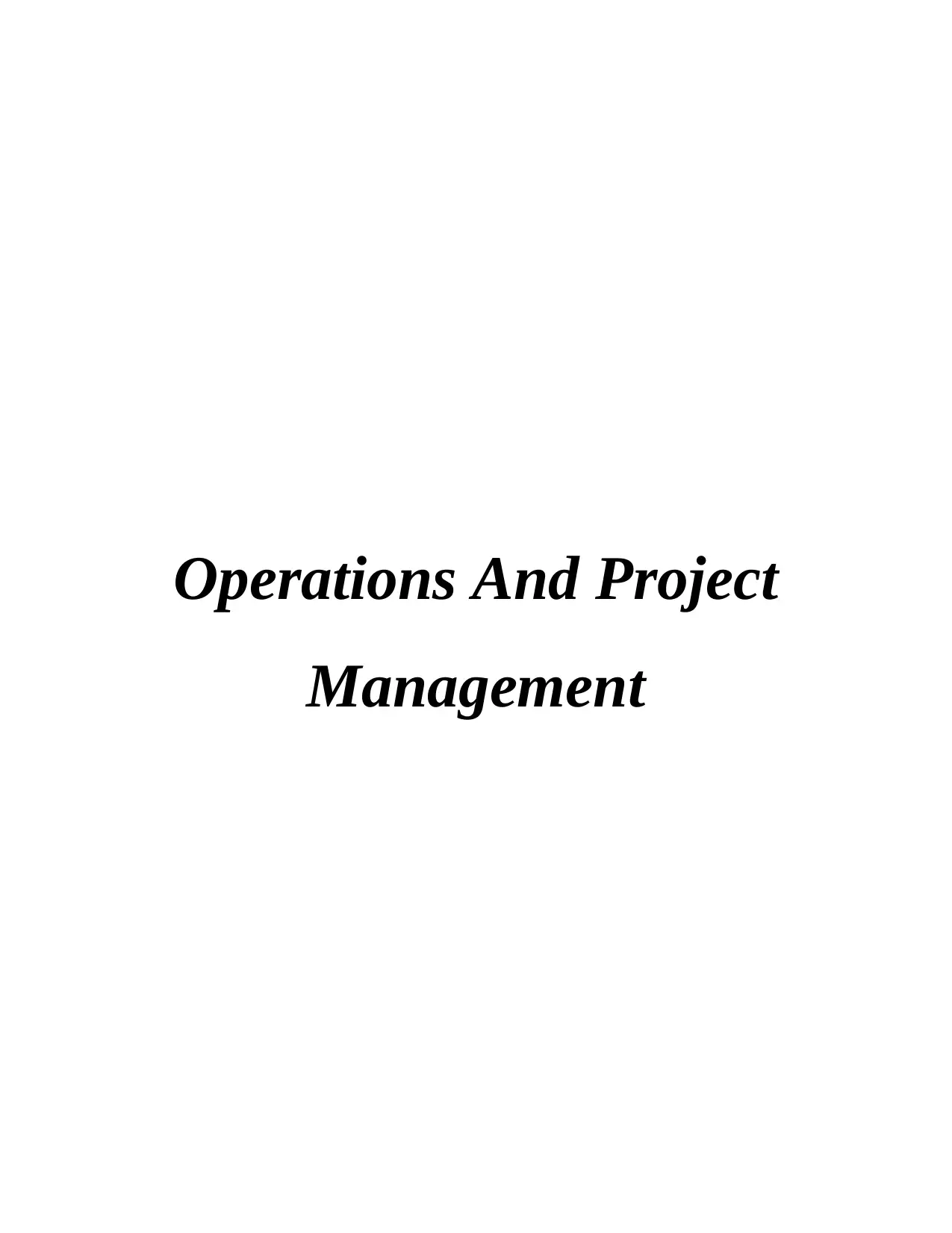
Operations And Project
Management
Management
Paraphrase This Document
Need a fresh take? Get an instant paraphrase of this document with our AI Paraphraser
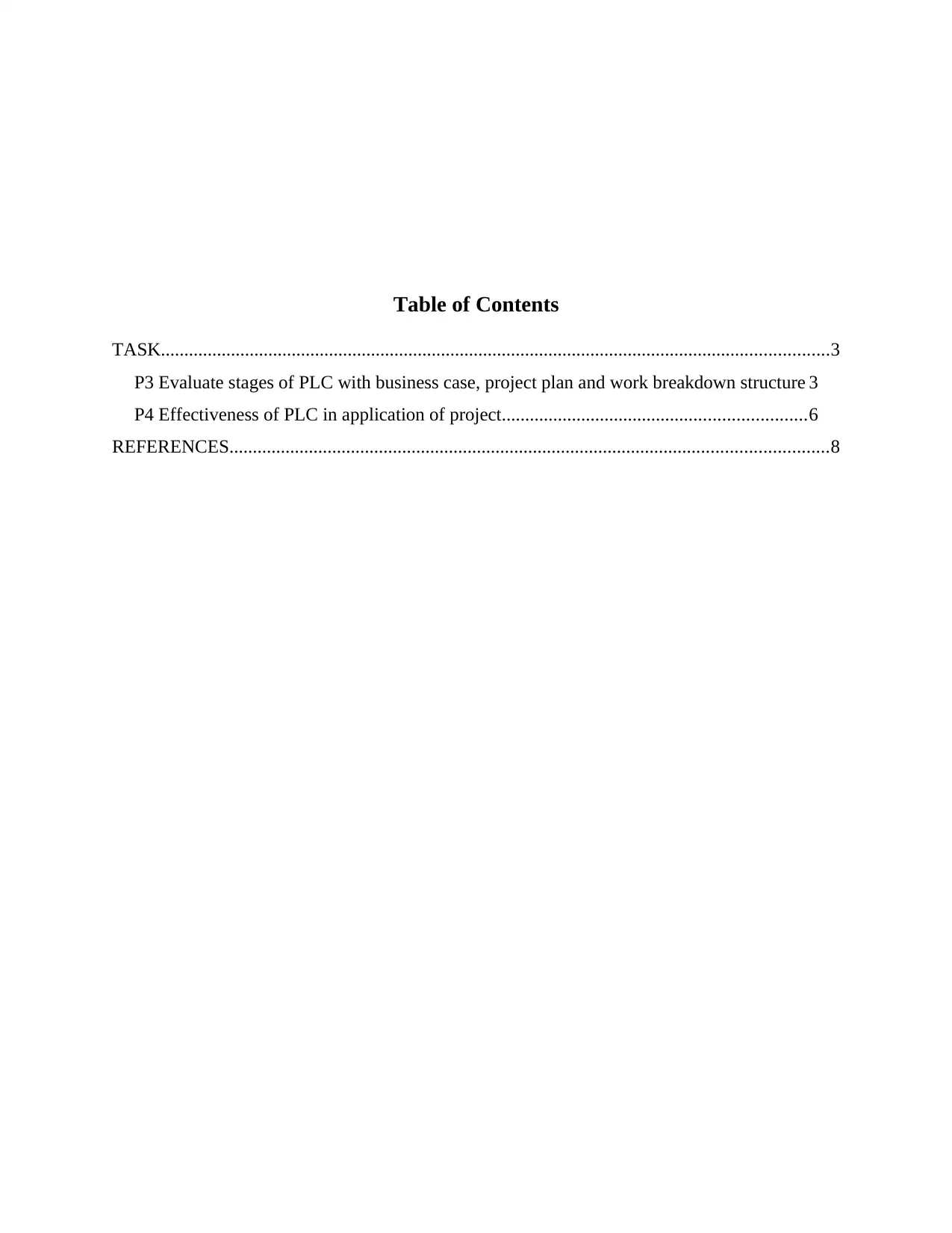
Table of Contents
TASK...............................................................................................................................................3
P3 Evaluate stages of PLC with business case, project plan and work breakdown structure 3
P4 Effectiveness of PLC in application of project.................................................................6
REFERENCES................................................................................................................................8
TASK...............................................................................................................................................3
P3 Evaluate stages of PLC with business case, project plan and work breakdown structure 3
P4 Effectiveness of PLC in application of project.................................................................6
REFERENCES................................................................................................................................8
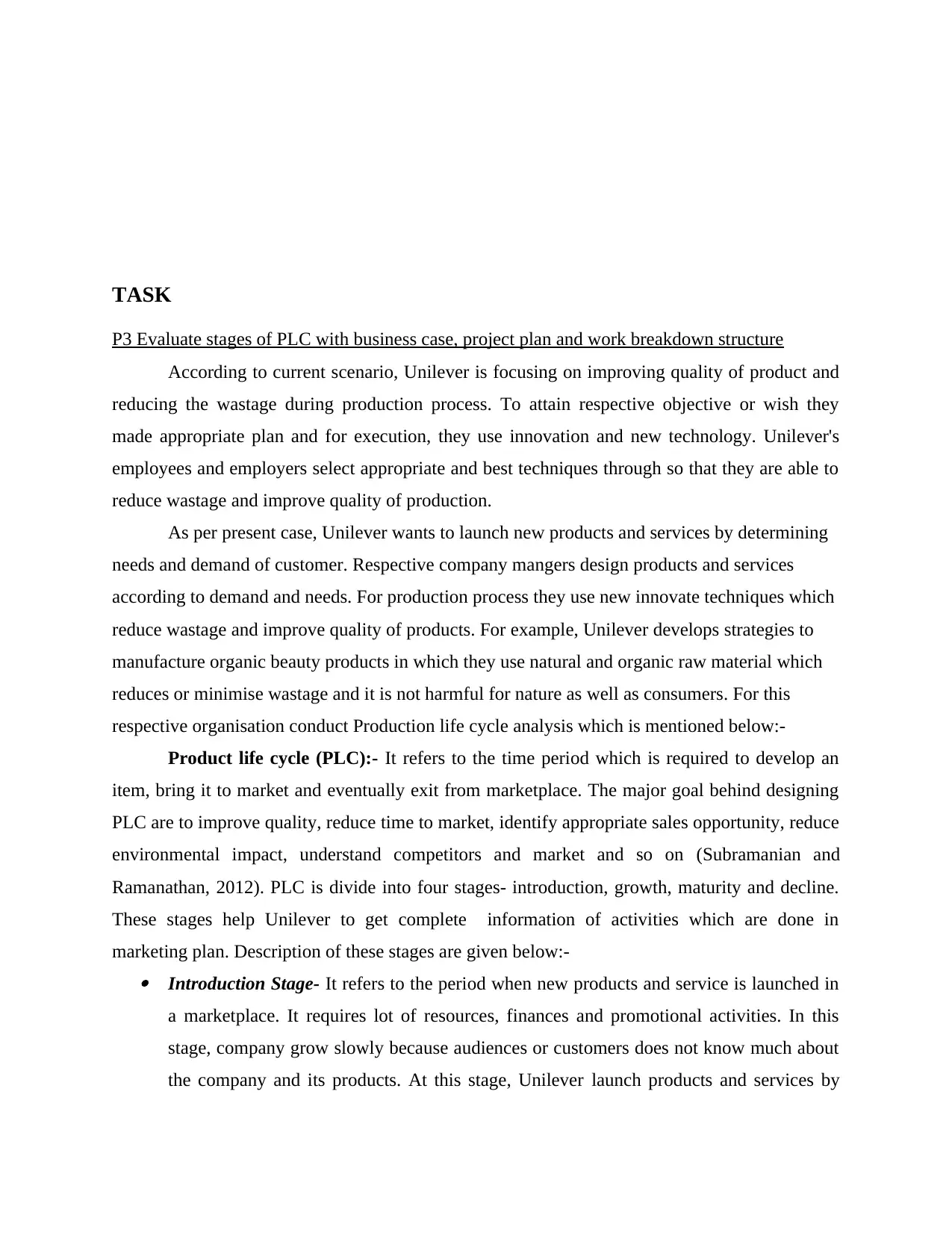
TASK
P3 Evaluate stages of PLC with business case, project plan and work breakdown structure
According to current scenario, Unilever is focusing on improving quality of product and
reducing the wastage during production process. To attain respective objective or wish they
made appropriate plan and for execution, they use innovation and new technology. Unilever's
employees and employers select appropriate and best techniques through so that they are able to
reduce wastage and improve quality of production.
As per present case, Unilever wants to launch new products and services by determining
needs and demand of customer. Respective company mangers design products and services
according to demand and needs. For production process they use new innovate techniques which
reduce wastage and improve quality of products. For example, Unilever develops strategies to
manufacture organic beauty products in which they use natural and organic raw material which
reduces or minimise wastage and it is not harmful for nature as well as consumers. For this
respective organisation conduct Production life cycle analysis which is mentioned below:-
Product life cycle (PLC):- It refers to the time period which is required to develop an
item, bring it to market and eventually exit from marketplace. The major goal behind designing
PLC are to improve quality, reduce time to market, identify appropriate sales opportunity, reduce
environmental impact, understand competitors and market and so on (Subramanian and
Ramanathan, 2012). PLC is divide into four stages- introduction, growth, maturity and decline.
These stages help Unilever to get complete information of activities which are done in
marketing plan. Description of these stages are given below:- Introduction Stage- It refers to the period when new products and service is launched in
a marketplace. It requires lot of resources, finances and promotional activities. In this
stage, company grow slowly because audiences or customers does not know much about
the company and its products. At this stage, Unilever launch products and services by
P3 Evaluate stages of PLC with business case, project plan and work breakdown structure
According to current scenario, Unilever is focusing on improving quality of product and
reducing the wastage during production process. To attain respective objective or wish they
made appropriate plan and for execution, they use innovation and new technology. Unilever's
employees and employers select appropriate and best techniques through so that they are able to
reduce wastage and improve quality of production.
As per present case, Unilever wants to launch new products and services by determining
needs and demand of customer. Respective company mangers design products and services
according to demand and needs. For production process they use new innovate techniques which
reduce wastage and improve quality of products. For example, Unilever develops strategies to
manufacture organic beauty products in which they use natural and organic raw material which
reduces or minimise wastage and it is not harmful for nature as well as consumers. For this
respective organisation conduct Production life cycle analysis which is mentioned below:-
Product life cycle (PLC):- It refers to the time period which is required to develop an
item, bring it to market and eventually exit from marketplace. The major goal behind designing
PLC are to improve quality, reduce time to market, identify appropriate sales opportunity, reduce
environmental impact, understand competitors and market and so on (Subramanian and
Ramanathan, 2012). PLC is divide into four stages- introduction, growth, maturity and decline.
These stages help Unilever to get complete information of activities which are done in
marketing plan. Description of these stages are given below:- Introduction Stage- It refers to the period when new products and service is launched in
a marketplace. It requires lot of resources, finances and promotional activities. In this
stage, company grow slowly because audiences or customers does not know much about
the company and its products. At this stage, Unilever launch products and services by
⊘ This is a preview!⊘
Do you want full access?
Subscribe today to unlock all pages.

Trusted by 1+ million students worldwide
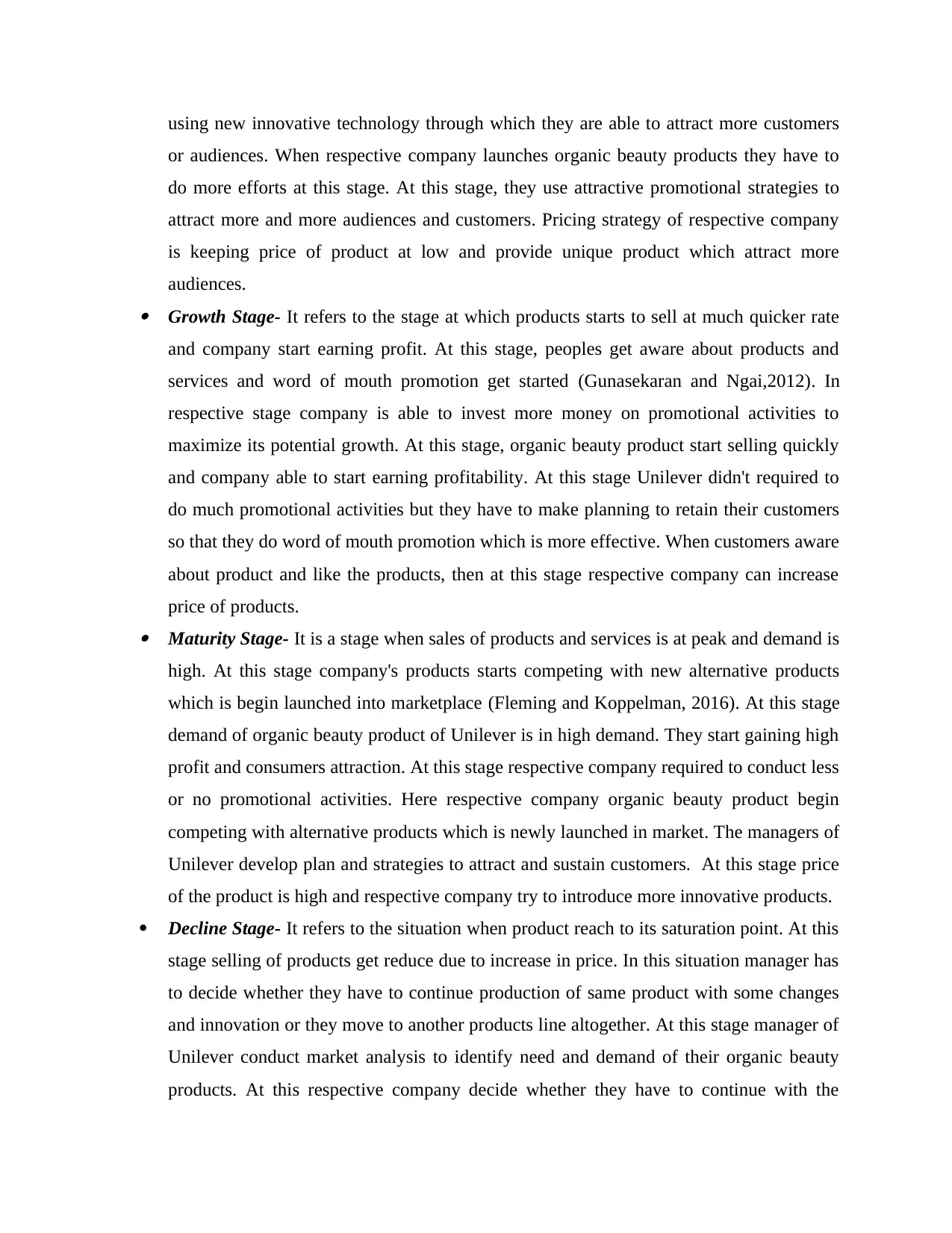
using new innovative technology through which they are able to attract more customers
or audiences. When respective company launches organic beauty products they have to
do more efforts at this stage. At this stage, they use attractive promotional strategies to
attract more and more audiences and customers. Pricing strategy of respective company
is keeping price of product at low and provide unique product which attract more
audiences. Growth Stage- It refers to the stage at which products starts to sell at much quicker rate
and company start earning profit. At this stage, peoples get aware about products and
services and word of mouth promotion get started (Gunasekaran and Ngai,2012). In
respective stage company is able to invest more money on promotional activities to
maximize its potential growth. At this stage, organic beauty product start selling quickly
and company able to start earning profitability. At this stage Unilever didn't required to
do much promotional activities but they have to make planning to retain their customers
so that they do word of mouth promotion which is more effective. When customers aware
about product and like the products, then at this stage respective company can increase
price of products. Maturity Stage- It is a stage when sales of products and services is at peak and demand is
high. At this stage company's products starts competing with new alternative products
which is begin launched into marketplace (Fleming and Koppelman, 2016). At this stage
demand of organic beauty product of Unilever is in high demand. They start gaining high
profit and consumers attraction. At this stage respective company required to conduct less
or no promotional activities. Here respective company organic beauty product begin
competing with alternative products which is newly launched in market. The managers of
Unilever develop plan and strategies to attract and sustain customers. At this stage price
of the product is high and respective company try to introduce more innovative products.
Decline Stage- It refers to the situation when product reach to its saturation point. At this
stage selling of products get reduce due to increase in price. In this situation manager has
to decide whether they have to continue production of same product with some changes
and innovation or they move to another products line altogether. At this stage manager of
Unilever conduct market analysis to identify need and demand of their organic beauty
products. At this respective company decide whether they have to continue with the
or audiences. When respective company launches organic beauty products they have to
do more efforts at this stage. At this stage, they use attractive promotional strategies to
attract more and more audiences and customers. Pricing strategy of respective company
is keeping price of product at low and provide unique product which attract more
audiences. Growth Stage- It refers to the stage at which products starts to sell at much quicker rate
and company start earning profit. At this stage, peoples get aware about products and
services and word of mouth promotion get started (Gunasekaran and Ngai,2012). In
respective stage company is able to invest more money on promotional activities to
maximize its potential growth. At this stage, organic beauty product start selling quickly
and company able to start earning profitability. At this stage Unilever didn't required to
do much promotional activities but they have to make planning to retain their customers
so that they do word of mouth promotion which is more effective. When customers aware
about product and like the products, then at this stage respective company can increase
price of products. Maturity Stage- It is a stage when sales of products and services is at peak and demand is
high. At this stage company's products starts competing with new alternative products
which is begin launched into marketplace (Fleming and Koppelman, 2016). At this stage
demand of organic beauty product of Unilever is in high demand. They start gaining high
profit and consumers attraction. At this stage respective company required to conduct less
or no promotional activities. Here respective company organic beauty product begin
competing with alternative products which is newly launched in market. The managers of
Unilever develop plan and strategies to attract and sustain customers. At this stage price
of the product is high and respective company try to introduce more innovative products.
Decline Stage- It refers to the situation when product reach to its saturation point. At this
stage selling of products get reduce due to increase in price. In this situation manager has
to decide whether they have to continue production of same product with some changes
and innovation or they move to another products line altogether. At this stage manager of
Unilever conduct market analysis to identify need and demand of their organic beauty
products. At this respective company decide whether they have to continue with the
Paraphrase This Document
Need a fresh take? Get an instant paraphrase of this document with our AI Paraphraser
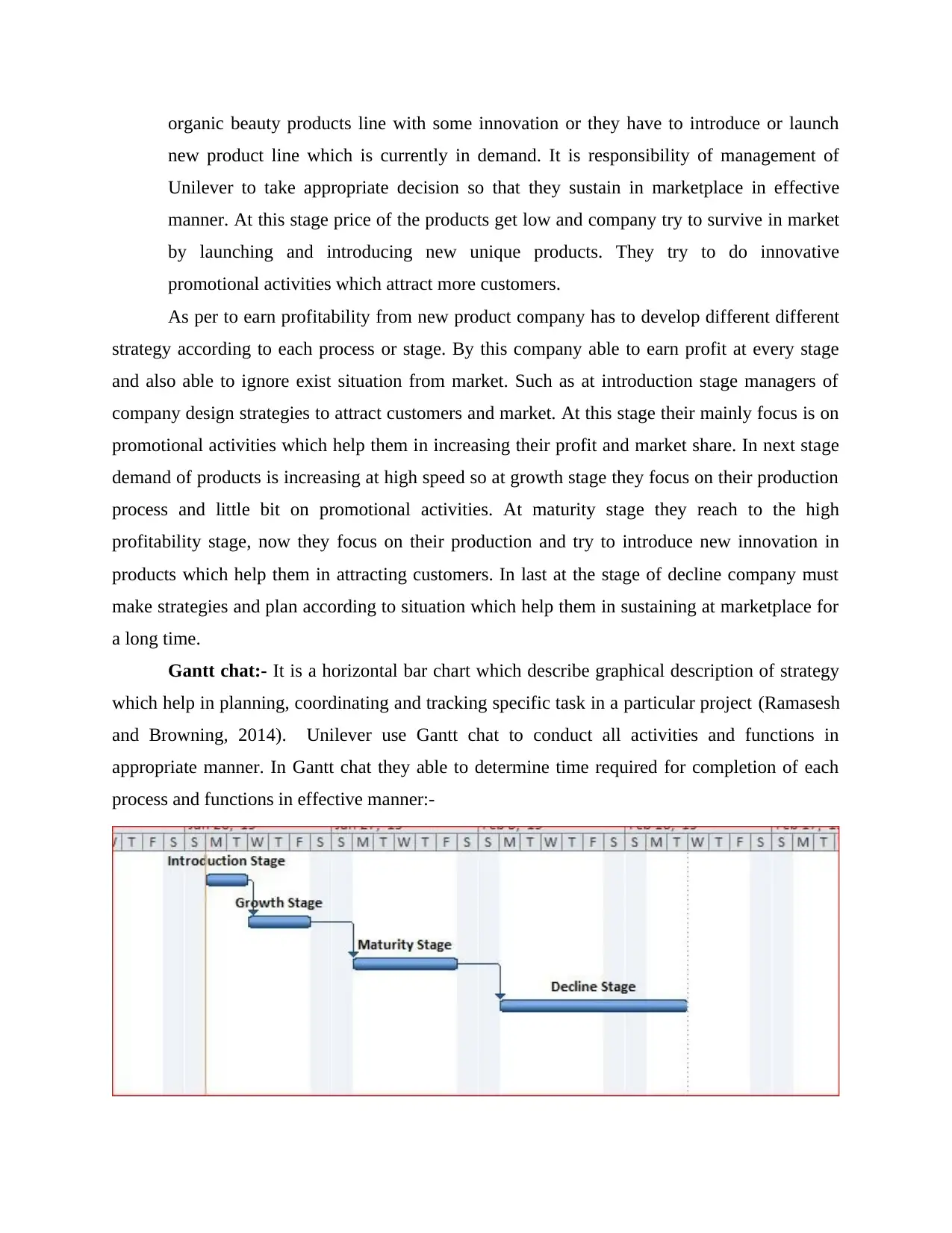
organic beauty products line with some innovation or they have to introduce or launch
new product line which is currently in demand. It is responsibility of management of
Unilever to take appropriate decision so that they sustain in marketplace in effective
manner. At this stage price of the products get low and company try to survive in market
by launching and introducing new unique products. They try to do innovative
promotional activities which attract more customers.
As per to earn profitability from new product company has to develop different different
strategy according to each process or stage. By this company able to earn profit at every stage
and also able to ignore exist situation from market. Such as at introduction stage managers of
company design strategies to attract customers and market. At this stage their mainly focus is on
promotional activities which help them in increasing their profit and market share. In next stage
demand of products is increasing at high speed so at growth stage they focus on their production
process and little bit on promotional activities. At maturity stage they reach to the high
profitability stage, now they focus on their production and try to introduce new innovation in
products which help them in attracting customers. In last at the stage of decline company must
make strategies and plan according to situation which help them in sustaining at marketplace for
a long time.
Gantt chat:- It is a horizontal bar chart which describe graphical description of strategy
which help in planning, coordinating and tracking specific task in a particular project (Ramasesh
and Browning, 2014). Unilever use Gantt chat to conduct all activities and functions in
appropriate manner. In Gantt chat they able to determine time required for completion of each
process and functions in effective manner:-
new product line which is currently in demand. It is responsibility of management of
Unilever to take appropriate decision so that they sustain in marketplace in effective
manner. At this stage price of the products get low and company try to survive in market
by launching and introducing new unique products. They try to do innovative
promotional activities which attract more customers.
As per to earn profitability from new product company has to develop different different
strategy according to each process or stage. By this company able to earn profit at every stage
and also able to ignore exist situation from market. Such as at introduction stage managers of
company design strategies to attract customers and market. At this stage their mainly focus is on
promotional activities which help them in increasing their profit and market share. In next stage
demand of products is increasing at high speed so at growth stage they focus on their production
process and little bit on promotional activities. At maturity stage they reach to the high
profitability stage, now they focus on their production and try to introduce new innovation in
products which help them in attracting customers. In last at the stage of decline company must
make strategies and plan according to situation which help them in sustaining at marketplace for
a long time.
Gantt chat:- It is a horizontal bar chart which describe graphical description of strategy
which help in planning, coordinating and tracking specific task in a particular project (Ramasesh
and Browning, 2014). Unilever use Gantt chat to conduct all activities and functions in
appropriate manner. In Gantt chat they able to determine time required for completion of each
process and functions in effective manner:-
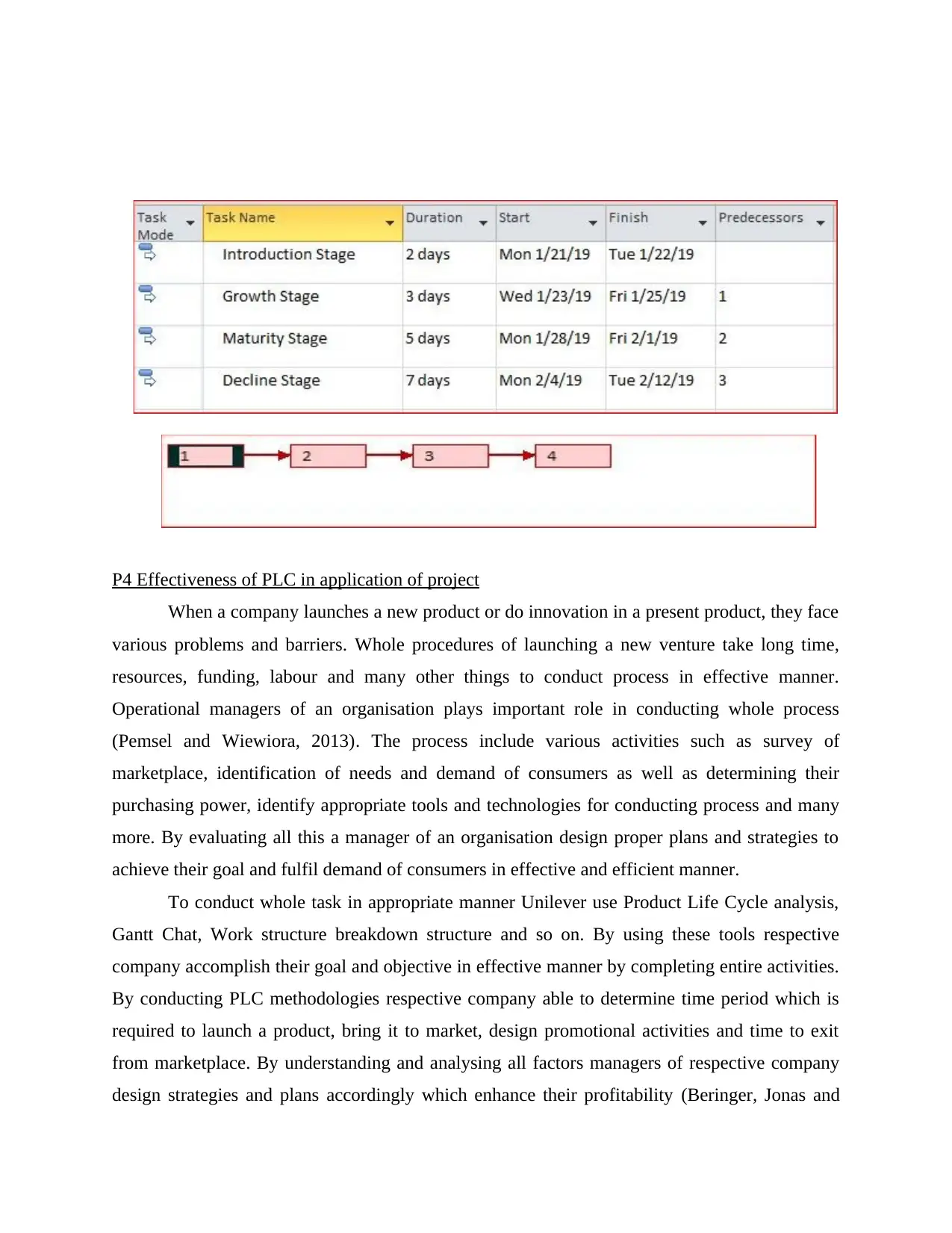
P4 Effectiveness of PLC in application of project
When a company launches a new product or do innovation in a present product, they face
various problems and barriers. Whole procedures of launching a new venture take long time,
resources, funding, labour and many other things to conduct process in effective manner.
Operational managers of an organisation plays important role in conducting whole process
(Pemsel and Wiewiora, 2013). The process include various activities such as survey of
marketplace, identification of needs and demand of consumers as well as determining their
purchasing power, identify appropriate tools and technologies for conducting process and many
more. By evaluating all this a manager of an organisation design proper plans and strategies to
achieve their goal and fulfil demand of consumers in effective and efficient manner.
To conduct whole task in appropriate manner Unilever use Product Life Cycle analysis,
Gantt Chat, Work structure breakdown structure and so on. By using these tools respective
company accomplish their goal and objective in effective manner by completing entire activities.
By conducting PLC methodologies respective company able to determine time period which is
required to launch a product, bring it to market, design promotional activities and time to exit
from marketplace. By understanding and analysing all factors managers of respective company
design strategies and plans accordingly which enhance their profitability (Beringer, Jonas and
When a company launches a new product or do innovation in a present product, they face
various problems and barriers. Whole procedures of launching a new venture take long time,
resources, funding, labour and many other things to conduct process in effective manner.
Operational managers of an organisation plays important role in conducting whole process
(Pemsel and Wiewiora, 2013). The process include various activities such as survey of
marketplace, identification of needs and demand of consumers as well as determining their
purchasing power, identify appropriate tools and technologies for conducting process and many
more. By evaluating all this a manager of an organisation design proper plans and strategies to
achieve their goal and fulfil demand of consumers in effective and efficient manner.
To conduct whole task in appropriate manner Unilever use Product Life Cycle analysis,
Gantt Chat, Work structure breakdown structure and so on. By using these tools respective
company accomplish their goal and objective in effective manner by completing entire activities.
By conducting PLC methodologies respective company able to determine time period which is
required to launch a product, bring it to market, design promotional activities and time to exit
from marketplace. By understanding and analysing all factors managers of respective company
design strategies and plans accordingly which enhance their profitability (Beringer, Jonas and
⊘ This is a preview!⊘
Do you want full access?
Subscribe today to unlock all pages.

Trusted by 1+ million students worldwide
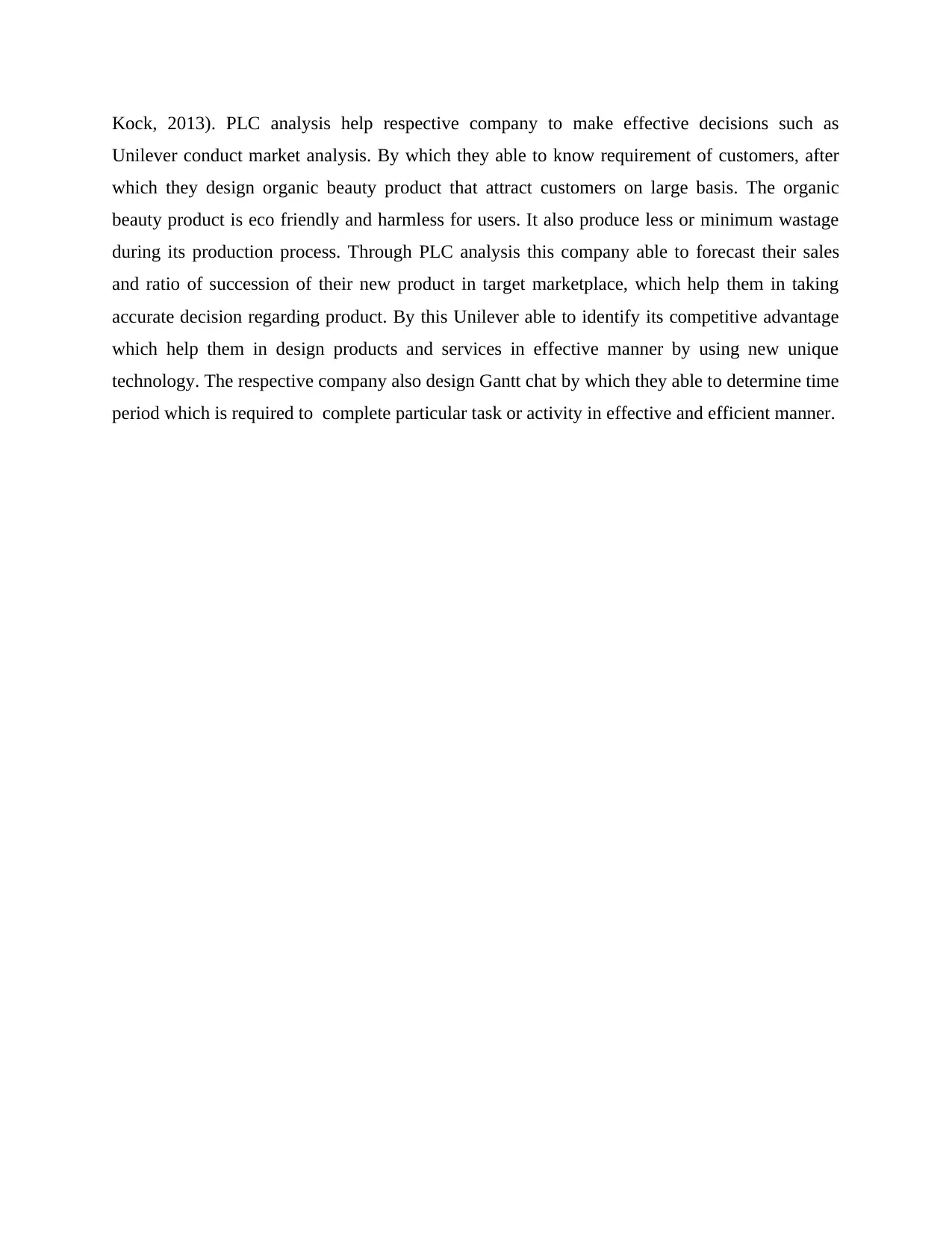
Kock, 2013). PLC analysis help respective company to make effective decisions such as
Unilever conduct market analysis. By which they able to know requirement of customers, after
which they design organic beauty product that attract customers on large basis. The organic
beauty product is eco friendly and harmless for users. It also produce less or minimum wastage
during its production process. Through PLC analysis this company able to forecast their sales
and ratio of succession of their new product in target marketplace, which help them in taking
accurate decision regarding product. By this Unilever able to identify its competitive advantage
which help them in design products and services in effective manner by using new unique
technology. The respective company also design Gantt chat by which they able to determine time
period which is required to complete particular task or activity in effective and efficient manner.
Unilever conduct market analysis. By which they able to know requirement of customers, after
which they design organic beauty product that attract customers on large basis. The organic
beauty product is eco friendly and harmless for users. It also produce less or minimum wastage
during its production process. Through PLC analysis this company able to forecast their sales
and ratio of succession of their new product in target marketplace, which help them in taking
accurate decision regarding product. By this Unilever able to identify its competitive advantage
which help them in design products and services in effective manner by using new unique
technology. The respective company also design Gantt chat by which they able to determine time
period which is required to complete particular task or activity in effective and efficient manner.
Paraphrase This Document
Need a fresh take? Get an instant paraphrase of this document with our AI Paraphraser
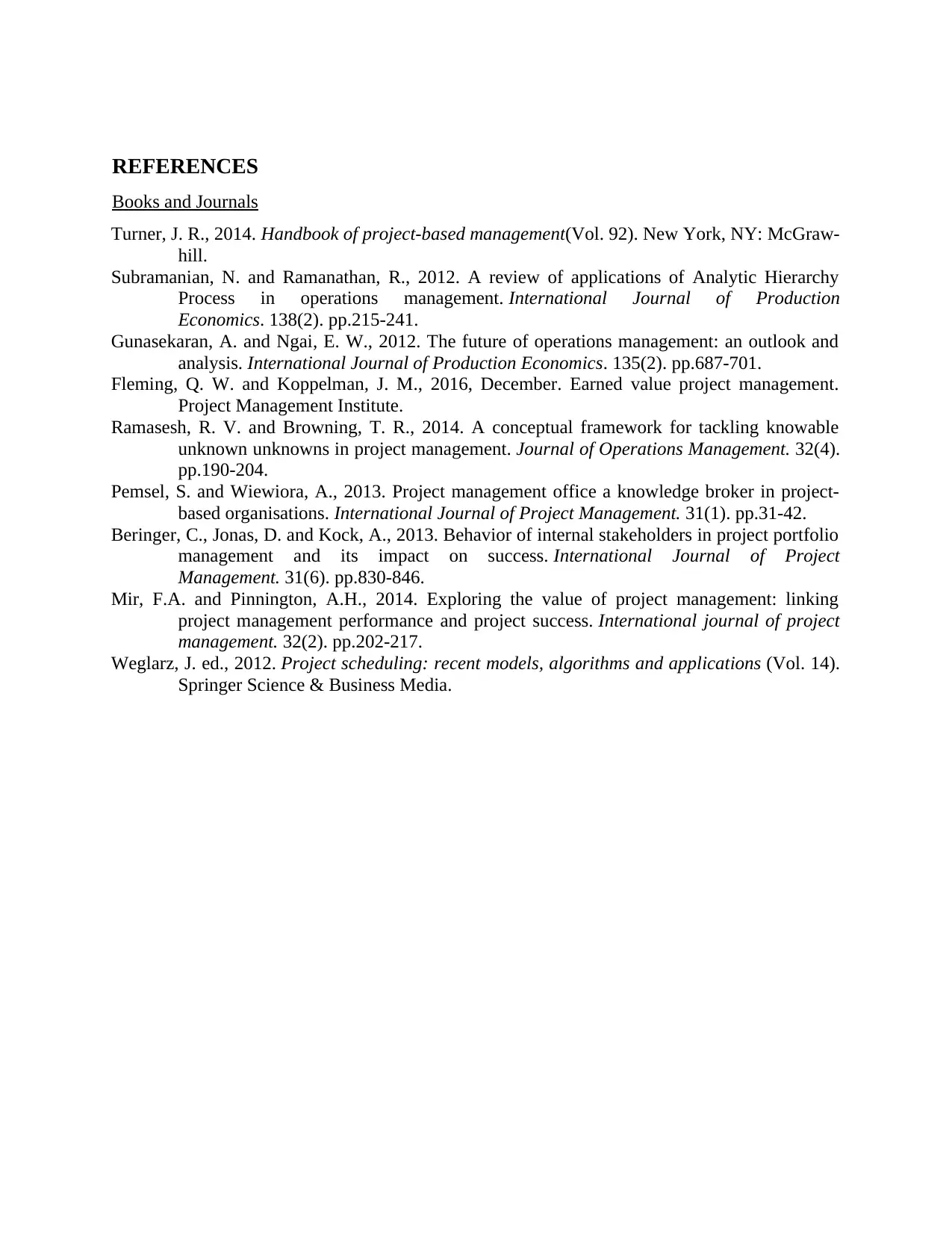
REFERENCES
Books and Journals
Turner, J. R., 2014. Handbook of project-based management(Vol. 92). New York, NY: McGraw-
hill.
Subramanian, N. and Ramanathan, R., 2012. A review of applications of Analytic Hierarchy
Process in operations management. International Journal of Production
Economics. 138(2). pp.215-241.
Gunasekaran, A. and Ngai, E. W., 2012. The future of operations management: an outlook and
analysis. International Journal of Production Economics. 135(2). pp.687-701.
Fleming, Q. W. and Koppelman, J. M., 2016, December. Earned value project management.
Project Management Institute.
Ramasesh, R. V. and Browning, T. R., 2014. A conceptual framework for tackling knowable
unknown unknowns in project management. Journal of Operations Management. 32(4).
pp.190-204.
Pemsel, S. and Wiewiora, A., 2013. Project management office a knowledge broker in project-
based organisations. International Journal of Project Management. 31(1). pp.31-42.
Beringer, C., Jonas, D. and Kock, A., 2013. Behavior of internal stakeholders in project portfolio
management and its impact on success. International Journal of Project
Management. 31(6). pp.830-846.
Mir, F.A. and Pinnington, A.H., 2014. Exploring the value of project management: linking
project management performance and project success. International journal of project
management. 32(2). pp.202-217.
Weglarz, J. ed., 2012. Project scheduling: recent models, algorithms and applications (Vol. 14).
Springer Science & Business Media.
Books and Journals
Turner, J. R., 2014. Handbook of project-based management(Vol. 92). New York, NY: McGraw-
hill.
Subramanian, N. and Ramanathan, R., 2012. A review of applications of Analytic Hierarchy
Process in operations management. International Journal of Production
Economics. 138(2). pp.215-241.
Gunasekaran, A. and Ngai, E. W., 2012. The future of operations management: an outlook and
analysis. International Journal of Production Economics. 135(2). pp.687-701.
Fleming, Q. W. and Koppelman, J. M., 2016, December. Earned value project management.
Project Management Institute.
Ramasesh, R. V. and Browning, T. R., 2014. A conceptual framework for tackling knowable
unknown unknowns in project management. Journal of Operations Management. 32(4).
pp.190-204.
Pemsel, S. and Wiewiora, A., 2013. Project management office a knowledge broker in project-
based organisations. International Journal of Project Management. 31(1). pp.31-42.
Beringer, C., Jonas, D. and Kock, A., 2013. Behavior of internal stakeholders in project portfolio
management and its impact on success. International Journal of Project
Management. 31(6). pp.830-846.
Mir, F.A. and Pinnington, A.H., 2014. Exploring the value of project management: linking
project management performance and project success. International journal of project
management. 32(2). pp.202-217.
Weglarz, J. ed., 2012. Project scheduling: recent models, algorithms and applications (Vol. 14).
Springer Science & Business Media.
1 out of 8
Related Documents
Your All-in-One AI-Powered Toolkit for Academic Success.
+13062052269
info@desklib.com
Available 24*7 on WhatsApp / Email
![[object Object]](/_next/static/media/star-bottom.7253800d.svg)
Unlock your academic potential
Copyright © 2020–2026 A2Z Services. All Rights Reserved. Developed and managed by ZUCOL.




